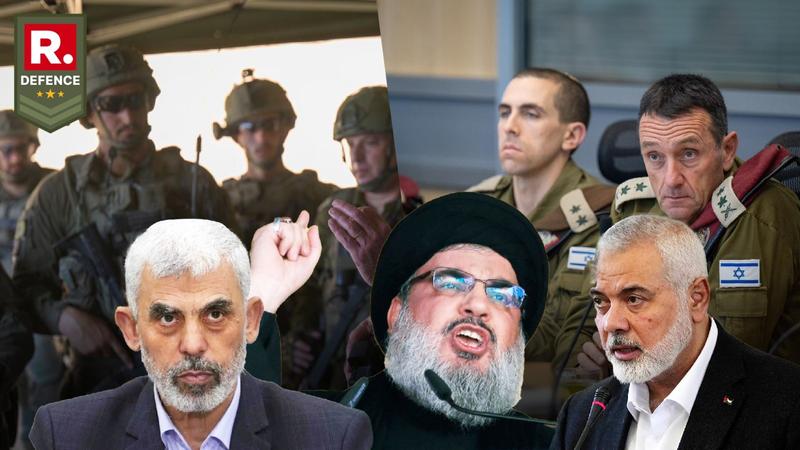Published 17:20 IST, October 22nd 2024
How Israel’s Targeted Assassinations Decapitated Hamas and Hezbollah Leadership
In a series of highly coordinated operations, Israel successfully targeted and killed key leaders of Hamas and Hezbollah.

Jerusalem, Israel– In a series of coordinated and highly precise military operations, Israel successfully eliminated three prominent figures from Hamas and Hezbollah: Ismail Haniyeh, Hassan Nasrallah, and Yahya Sinwar. These targeted assassinations marked a significant escalation in Israel’s counter-terrorism strategy, dealing a crippling blow to both organizations' leadership and signaling a shift in regional power dynamics.
Ismail Haniyeh – Hamas Political Leader

- Date of Operation: July 31, 2024
- Location: Tehran, Iran
Ismail Haniyeh, the head of Hamas’ political wing, was assassinated during his visit to Tehran for the inauguration of Iran’s new president, Masoud Pezeshkian. A longstanding figure in orchestrating terrorist activities against Israel, Haniyeh was seen as a crucial link between Hamas and Iran’s military support. Months of Israeli surveillance culminated in a remote-controlled explosive device being triggered within his guesthouse. Initially thought to be an airstrike, it was later revealed that Israeli operatives had pre-placed the explosive device, ensuring minimal collateral damage.
The aftermath saw Iran’s Supreme Leader, Ali Khamenei, lead a high-profile funeral, and the incident strained relations between Hamas and Iran. Haniyeh's death significantly weakened Hamas’s political operations abroad, affecting its outreach for international support.
Hassan Nasrallah – Hezbollah’s Secretary-General

- Date of Operation: September 27, 2024
- Location: Beirut, Lebanon
Hassan Nasrallah, one of Israel’s oldest adversaries and the leader of Hezbollah, was targeted in a surgical airstrike in Beirut. The Israeli Air Force (IAF) launched an attack on Hezbollah’s headquarters, killing Nasrallah and several of his close aides. Reports indicated that Nasrallah died from toxic fumes rather than direct injury, underscoring the precision of the strike. His death signified a major tactical victory for Israel, which had spent years gathering intelligence to dismantle Hezbollah’s leadership.
Nasrallah’s death triggered political upheaval within Lebanon, with Hezbollah’s influence waning and increasing public resentment towards the group’s political stronghold. It also left a void in Hezbollah’s military leadership, bringing the organization into a vulnerable state.
Yahya Sinwar – Hamas Military Commander

- Date of Operation: October 17, 2024
- Location: Gaza Strip
Yahya Sinwar, the military leader of Hamas, was killed in a firefight with Israeli Defense Forces (IDF) in Gaza. Sinwar had a long history of leading military operations against Israel and was a top priority for Israeli intelligence. In the chaotic aftermath of the battle, there was initial confusion over his fate, but DNA testing confirmed his death. His elimination was seen as a major blow to Hamas’s military structure, undermining its ability to conduct coordinated operations against Israel.
Strategic Implications of the Assassinations
The coordinated assassinations of Haniyeh, Nasrallah, and Sinwar demonstrated Israel’s tactical precision and intelligence capabilities. These operations were conducted with minimal civilian casualties, despite the high-risk environments in which these leaders were located. Israeli Prime Minister Benjamin Netanyahu praised the operations, calling them a “decisive step towards regional security.”

For Hamas and Hezbollah, the loss of these pivotal leaders has thrown both organizations into disarray. The deaths of Haniyeh and Sinwar decapitated Hamas's political and military leadership, creating a power vacuum. Similarly, Nasrallah’s death left Hezbollah leaderless, forcing the organization to confront internal divisions and a weakened political influence in Lebanon.
International and Regional Reactions
While Israel received condemnation from its regional adversaries, including Iran and Hezbollah, many of its Western allies, particularly the United States, stood by Israel’s right to self-defense. Iran's loss of Haniyeh further complicated its relationships with Palestinian resistance groups, creating a strain on its support network.
The operations have reshaped the geopolitical landscape in the Middle East. With Hamas and Hezbollah weakened, Israel’s position in the region has been bolstered, and its counter-terrorism tactics have proven to be remarkably effective in neutralizing high-value targets.

The 2024 targeted assassinations of Ismail Haniyeh, Hassan Nasrallah, and Yahya Sinwar represent a significant turning point in Israel’s counter-terrorism operations. The precision of these strikes, combined with advanced intelligence and operational execution, has crippled both Hamas and Hezbollah, potentially altering the balance of power in the region for years to come.
These successful operations underscore Israel’s dominance in intelligence and military tactics, reinforcing its position as a regional power capable of surgically dismantling terrorist organizations. As Hamas and Hezbollah struggle to regroup, the future of their operations remains uncertain, leaving Israel with a strategic upper hand in a region fraught with tensions.
Updated 17:20 IST, October 22nd 2024




